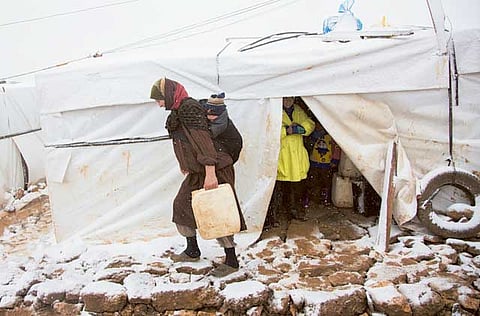Aid sought for Syrian refugees facing harsh winter
Warm Hearts campaign urges people to donate money for shelter and blankets

Sharjah: The harsh winter has hit hundreds of thousands of Syrian refugees in Iraq, Lebanon, Jordan and Syria. Sharjah’s Big Heart campaign is racing against time as it urgently tries to mobilise the public to support its ‘Warm Hearts’ donation drive to provide shelter and blankets for those refugees.
Making the situation worse, the overcrowded refugee shelters are now home to many newborns and infants who were born after their parents fled Syria. Among the long list of dangers, the winter has also brought frostbite which could lead to limbs being amputated or hypothermia which could result in death.
Shaikha Jawaher Bint Mohammad Al Qasimi, Wife of His Highness Dr Shaikh Sultan Bin Mohammad Al Qasimi, Member of the Supreme Council and Ruler of Sharjah, in her capacity as the Chairperson of the Supreme Council for Family Affairs and the Eminent Advocate for Refugee Children for the UN refugee agency (UNHCR), made a plea to the public: “We are extremely grateful to all those who donated warm clothing in response to the ‘Warm Hearts’ campaign. However, the tragic reality is that the situation has now gone from critical to catastrophic.”
She explained that the freezing temperature prevents many refugee children from going to school, while their parents are unable to go and seek urgent medical attention.
Pre-fab homes
“If we don’t provide adequate shelter, blankets and warm clothing, we may have many casualties — many of them children. Only the warmth of your hearts can save them, so let’s join hands in donating pre-fab homes and winter supplies to the Syrian families under the cold, dark, open skies right now.”
Previously, the Big Heart campaign managed to put a roof over the heads of 10,000 homeless Syrians, while also bringing desperately needed food, cash and other relief to 400,000 Syrian refugees across the region.
It has also arranged for urgently needed medical treatment for 265,000 Syrians, with interventions ranging from artificial limbs after amputations, to chronic diseases and corrective surgery to remedy the effects of surgeries that were done at poorly equipped and under-staffed makeshift hospitals.
Temperatures have plummeted to as low as -9C in Iraq, and below freezing point in Jordan, Lebanon and Syria. Since the refugees had to flee Syria in a hurry, most of them carried only minimal luggage, making heavy blankets very rare and leaving many refugees with only the clothes they escaped their homeland with.
Their crudely constructed makeshift shelters are overcrowded and unsanitary, making a good night’s sleep a thing of the past.
The freezing temperature is not the only threat facing Syrians, as the winter will also make it harder for refugees to find clean drinking water or travel to seek medical attention or work, which, in turn, could trigger health pandemics — a situation that has been described as a “humanitarian time-bomb”.

